Programas de transferencias monetarias sectoriales
Los PTM pueden ayudar a las personas en situaciones de crisis a abordar sus necesidades dentro de un determinado sector humanitario, tales como: agua, alimentos, salud, vivienda, medios de vida, o protección. Los PTM sectoriales pueden ser restringidos o sin restricción, condicionales o incondicionales, y normalmente serán proporcionados como parte de un paquete integral que puede incluir asistencia en especie o servicios.
Cada sector tiene que considerar distintas preguntas, retos, ventajas y riesgos cuando se trata de apoyar la recuperación de las personas dentro de su área de especialización. Esto requiere evidencias, herramientas, orientación y capacidad. Para cumplir los resultados sectoriales a través de los PTM también se requiere de una comprensión multisectorial de las necesidades y de la seguridad económica de los hogares (vea las Transferencias monetarias multipropósito). Mientras que algunos sectores tienen mucha experiencia en la implementación de los PTM y lo han hecho por muchos años, otros se están poniendo al día. La mayoría de los sectores humanitarios están comprometidos y han venido aumentando sus esfuerzos en los PTM sectoriales. El Grupo global de coordinación de clusters (GCCG, por sus siglas en inglés) también se encuentra coordinando el trabajo entre clusters para mejorar la utilización sectorial de los PTM.
Prioridades actuales
La CALP Network trabaja en estrecha colaboración con los grupos técnicos de asistencia en efectivo y equipos de tareas dentro de los clusters globales, que han estado definiendo sus prioridades y planes de trabajo del 2020 durante sus reuniones regulares. Una descripción general y detalles específicos de estas prioridades en cada cluster global está disponible aquí.
Subpáginas de los PTM sectoriales
-
Coordinación y gestión de campamentos y programas de transferencias monetarias
-
Educación y programas de transferencias monetarias
-
Seguridad alimentaria y programas de transferencias monetarias
-
Salud y programas de transferencias monetarias
-
Nutrición y programas de transferencias monetarias
-
Protección y programas de transferencias monetarias
-
Alojamiento y programas de transferencias monetarias
-
Agua, saneamiento e higiene (WASH) y programas de transferencias monetarias
Contenido destacado
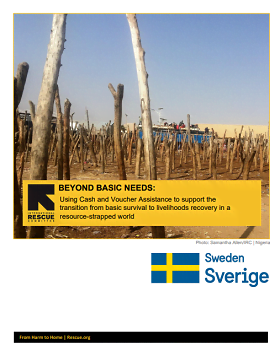
Beyond Basic Needs: Using Cash and Voucher Assistance to Support the Transition from Basic Survival to Livelihoods Recovery in a Resource-Strapped World
Guidelines and Tools
Do you think of yourself as a “cash” person OR as a “livelihoods” person? An “emergency” practitioner OR a “recovery” practitioner? Or do you find yourself unsatisfied with the often narrow implications of these terms? We’ll never have enough funding to provide basic needs support to everyone who needs it for the entire time they are in need, even if we take advantage of the...

Looking into 2020: short overview on global clusters, CVA and the CALP Network
Presentation
Overview as 2020 begins:
• Significant progress and commitment from all global clusters on integration of CVA into their work.
• Significant interest in different regions and by some donors on sector-specific CVA.
• Challenges that remain:
o Dialogue: 1) Ensuring CVA specialists understand sector specificities and successfully bank on the technical expertise emanating...

Building Evidence to inform the Effective Use of CASH and Voucher Assistance in Emergency Sanitation and Hygiene Programming
Report
An analysis of 5 case studies of utilization of CASH/Voucher Assistance are presented and analysed in the attempt of building evidence on their utilization in emergency WASH Sanitation and HP programming. Findings and recommendations are provided on Coordination, Situation and Response Analysis, Program Design, Implementation, Monitoring and Evaluation.
Últimos recursos
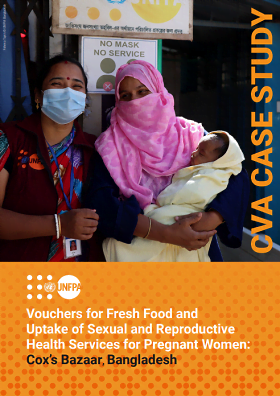
Vouchers for Fresh Food and Uptake of Sexual and Reproductive Health Services for Pregnant Women: Cox’s Bazaar, Bangladesh
Report
UNFPA found that facility-based deliveries by women in refugee camps in Cox’s Bazaar were low (35%), which is linked to increased maternal mortality. In addition, undernourishment among pregnant women in this community increased their risk of poor pregnancy outcomes such as obstructed labor and...

IOM Cash-Based Interventions Annual Report and Case Studies 2020
Case Study
The IOM Cash-Based Interventions (CBI) Annual Report and Case Studies 2020 features case studies from a large number of missions that implemented CBI in 2020 and highlights the increasing use of cash and voucher assistance in IOM, reaching more than 1.6 million beneficiaries in 56 countries. The case...
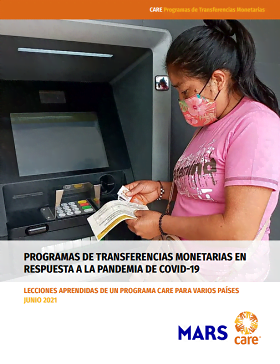
Programas de Transferencias Monetarias en Respuesta a la Pandemia de COVID-19 Lecciones Aprendidas de un Programa CARE Para varios Países
Informe
CARE implementó un programa en varios países, con el objetivo de reducir los impactos negativos del COVID-19 en las poblaciones vulnerables, especialmente en las mujeres y las niñas, utilizando enfoques complementarios y multimodales, incluyendo la provisión de asistencia en efectivo y con vales...
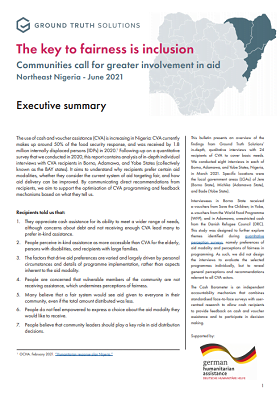
The Key to Fairness is Inclusion: Understanding Perceptions of Fairness and Aid Modality Preferences in Northeast Nigeria
Report
The use of cash and voucher assistance (CVA) is increasing in Nigeria: CVA currently makes up around 50% of the food security response, and was received by 1.8 million internally displaced persons (IDPs) in 2020. Following-up on a quantitative survey that we conducted in 2020, this report contains...

CVA for Child Protection Outcomes: Case study from Cambodia
Video
Save the Children Cambodia and seven partner organizations are working to improve households’ ability to care for their children and achieve positive child protection outcomes. With support from USAID Cambodia and European Union in Cambodia, FCF|REACT is providing monthly cash transfers and supporting...

Economic Relief, Recovery, And Resilience Assessment For Southern Iraq
Report
The profile of Southern Iraq varies from that of the Northern ‘conflict-affected’ governorates most heavily impacted by the conflict with the Islamic State between 2014-2017. Southern Iraq has seen chronic underinvestment since the 1980s, with cumulative impacts building across the Iran-Iraq War and...

Global CWG Terms of Reference – 2021
Guidelines and Tools
The Global Cash Working Group (GCWG) (formerly the Geneva-based Cash Working Group (GbCWG)) was initially formed by practitioners in 2013 and led by ICRC and the CALP Network. In order to reflect a more inclusive and representative leadership arrangement and recognising the workload considerations from...

Annex the CALP Network MENA study CVA for Health examples 2021
Guidelines and Tools
This protected spreadsheet is the accompanying Annex to the CALP Network study A ‘Stocktake’ of CVA for Health Outcomes in the MENA Region: Moving from Evidence to Practice’ and provides further details of the projects studied in the stocktaking exercise.
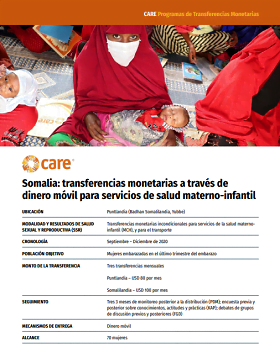
Somalia: transferencias monetarias a través de dinero móvil para servicios de salud materno-infantil
Informe
Este estudio es parte de un estudio multipaís más amplio realizado por CARE titulado “Programas de Transferencias
Monetarias para Salud Sexual y Reproductiva: Aprendizajes de Ecuador, Colombia, Líbano y Somalia”.
CARE Somalia ha utilizado los PTM en sus programas durante más de diez años. Esto...
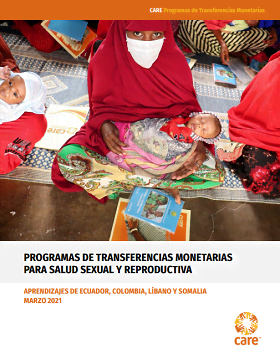
Programas de transferencias monetarias para salud sexual y reproductiva
Informe
El estudio analizó los programas en cuatro contextos (Colombia, Ecuador, Líbano y Somalia). Dos asesores emprendieron el estudio inicial, uno se enfocó en el Líbano y Somalia y el otro en Colombia y Ecuador. La recolección de datos incluyó 25 entrevistas con informantes clave con el personal de CARE...
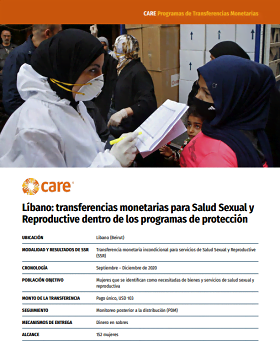
Líbano: transferencias monetarias para Salud Sexual y Reproductive dentro de los programas de protección
Informe
Este estudio es parte de un estudio multipaís más amplio realizado por CARE titulado “Programas de Transferencias
Monetarias para Salud Sexual y Reproductiva: Aprendizajes de Ecuador, Colombia, Líbano y Somalia”.
El 4 de agosto de 2020, una explosión en el puerto de Beirut dejó cientos de muertos...
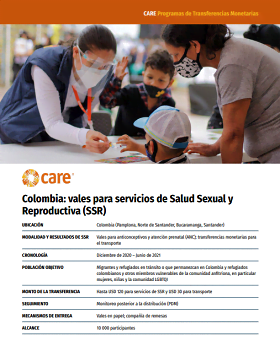
Colombia: vales para servicios de Salud Sexual y Reproductiva (SSR)
Informe
Este estudio es parte de un estudio multipaís más amplio realizado por CARE titulado “Programas de Transferencias
Monetarias para Salud Sexual y Reproductiva: Aprendizajes de Ecuador, Colombia, Líbano y Somalia”.
Como consecuencia de la crisis socioeconómica y política de Venezuela, se produjeron...
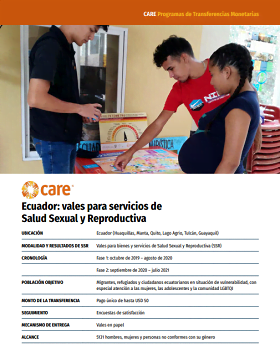
Ecuador: vales para servicios de Salud Sexual y Reproductiva
Informe
Este estudio es parte de un estudio multipaís más amplio realizado por CARE titulado “Programas de Transferencias
Monetarias para Salud Sexual y Reproductiva: Aprendizajes de Ecuador, Colombia, Líbano y Somalia”.
Ecuador es tanto un país de tránsito como un país de destino para los refugiados y...
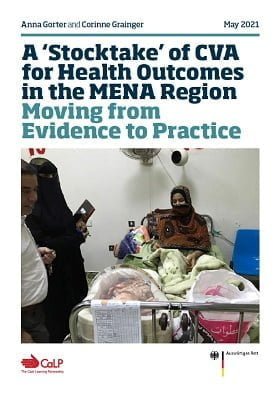
A ‘Stocktake’ of CVA for Health Outcomes in the MENA Region Moving from Evidence to Practice
Report
This report sets out the findings from a ‘stocktake’ or rapid operational research study of Cash and Voucher Assistance (CVA) for health outcomes in the Middle East and North Africa (MENA) region. Countries in this study are drawn from Cash Learning Partnership’s (the CALP Network) Tier 1 group of...

Use Of Cash Assistance To Address Maternal, Newborn And Child Health Outcomes
Report
USE OF CASH ASSISTANCE TO ADDRESS MATERNAL, NEWBORN AND CHILD HEALTH OUTCOMES
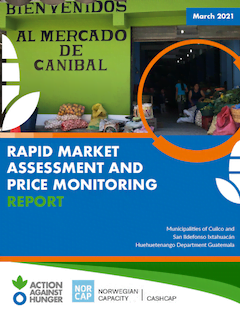
Rapid Market Assessment and Price Monitoring Report – Huehuetenango Department Guatemala
Report
Methodology: This rapid assessment of markets and prices was based on an adapted version of the IFRC’s Rapid Assessment for Markets, elements of the EMMA toolkit’s market system approach and the consortium of NGO’s price monitoring format. The methodology was chosen to give a basic and rapid...
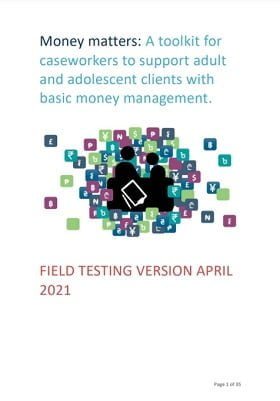
Money Matters: A toolkit for caseworkers to support adult and adolescent clients with basic money management
Guidelines and Tools
This tool is for use when child protection case management clients receive cash and voucher assistance as part of their child protection case management response. This tool sets out guidance for caseworkers that have previously had case management training. It will help caseworkers to support their...

Supporting Food Security Among Vulnerable Households in the Gaza Strip
Report
This final evaluation report draws on the results of several monitoring and evaluation activities, including two midterm focus group discussions (FGDs), two endline FGDs, three (one every two distribution cycles) rounds of post-distribution monitoring (PDMs), and one baseline survey performed as part of...

Los programas de transferencias monetarias (PTM) para el transporte a los centros de salud y de tratamiento de la malnutrición
Informe
Este estudio de caso se ha elaborado en el marco de un proyecto de documentación de experiencias con programas de transferencias monetarias (PTM) en el sector de la salud, financiado por la Agencia Suiza para el Desarrollo y la Cooperación (SDC), con el apoyo de Cash Learning Partnership (the CALP...
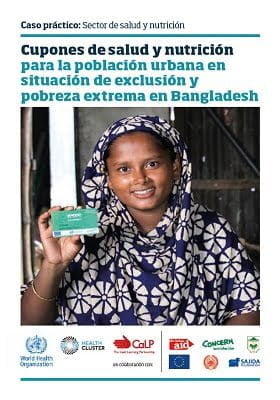
Cupones de salud y nutrición para la población urbana en situación de exclusión y pobreza extrema en Bangladesh
Informe
En Bangladesh, las personas en situación de pobreza en contextos urbanos se enfrentan a necesidades médicas de carácter complejo, incluida la elevada prevalencia de enfermedades no transmisibles, junto a un acceso insuficiente a servicios de salud y unos altos gastos médicos por cuenta propia. Las...


